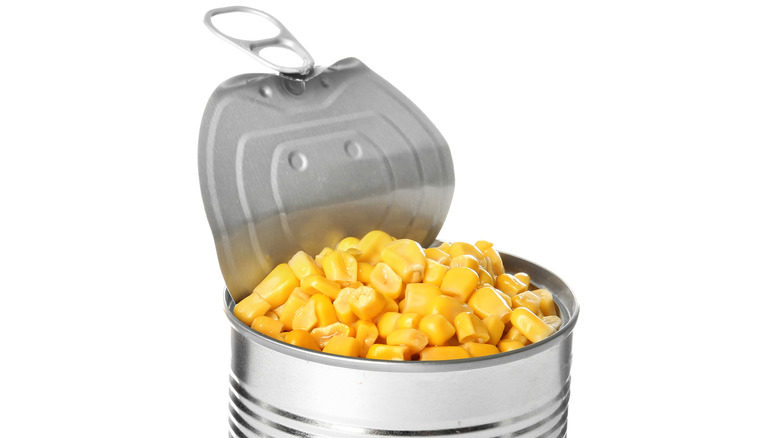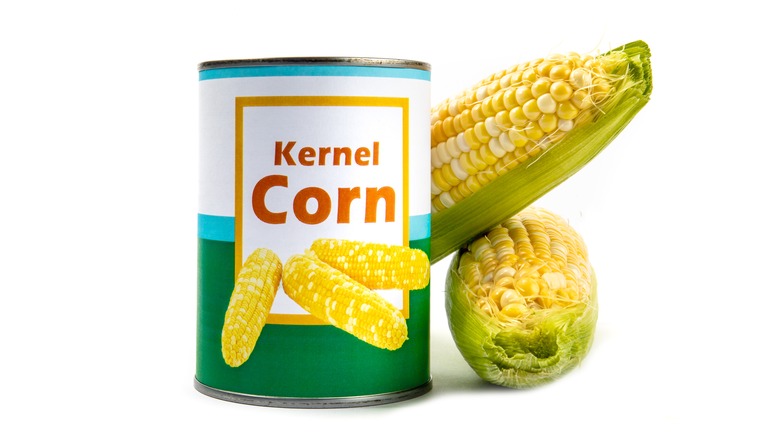Why You Should Always Have Canned Corn In Your Pantry
Corn is a food incorporated easily in many dishes, from Mexican casseroles to pastas, soups, and stews. The starchy veggie may get a bad rap due to its sugar and carb content, but its health benefits are plenty. Canned corn is a fantastic item to stock up on for many reasons, but you must also be mindful of a few things.
Most canned goods last for years in the pantry. The U.S. Department of Agriculture says that if the food's can doesn't contain rust, dents, or swelling, its contents will remain edible for years. Temperatures over 100 degrees Fahrenheit can harm canned foods, causing spoilage (via University of Minnesota Extension). Canned foods must be kept in a cool, dry place, and lids must be vacuum sealed. Many factors come into play when safely storing canned foods, but as long as you are mindful, they can last a very long time.
Canned corn is nutritious and shelf-stable
Canned corn may not be the first thing you consider stocking up on when you think of storable goods, but you should. These yellow nuggets make a great side dish or ingredient in various recipes. Sweet corn is also packed with nearly all B vitamins, which help support the blood-brain barrier and fuel the heart, cells, and muscles (via Livestrong). It is also rich in vitamin C, minerals, antioxidants, and beta carotene. According to Healthfully, canned corn is rich in protein, vitamin C, and fiber that supports a healthy digestive tract.
Canned corn is shelf-stable, meaning that when sealed, it remains edible for quite a while. Ovenvia says that canned corn remains good for three to five years, and Still Tasty agrees. The site says when corn is stored appropriately, it will usually last past the three- to five-year mark.
When seeking vegan-friendly creamed corn options, you're in luck. Many brands offer vegan creamed corn, meaning the cans don't contain cream. PETA says that these canned varieties include the "milk" from the cob of the corn and the kernel's liquid rather than actual lactose. It's a non-dairy option for vegans and those sensitive to dairy, and it blends well into many recipes.
Are there dangers in consuming canned corn?
Canned corn is an affordable, nutritious food; however, it must be consumed as part of a healthy diet. Healthline says that diabetics should limit starchy foods, including corn. Canned corn can raise blood sugar levels when eaten in excess, contributing to weight gain and diabetes.
The lining of the cans that contain these vegetables may contain BPA. According to Livestrong, bisphenol A (BPA) is a toxic chemical that may migrate to the food inside the cans. This chemical is linked to health concerns such as cancers, diabetes, birth defects, and heart disease, among other things (via The Center For Environmental Health). In a 2017 press release, the CEH said that nearly 40 percent of cans from major retailers still contained BPA.
Healthline says that corn is one of the most genetically modified foods. Royal Society claims no evidence exists proving GM foods as unsafe; however, Organic Authority says GM foods may have unpredictable consequences. Several countries have banned genetically engineered foods, but Missouri State University dietician Jaime Gnau says that it is untrue to say that GM foods are unsafe. She adds that these foods must undergo research and processes to pass safety regulations.


